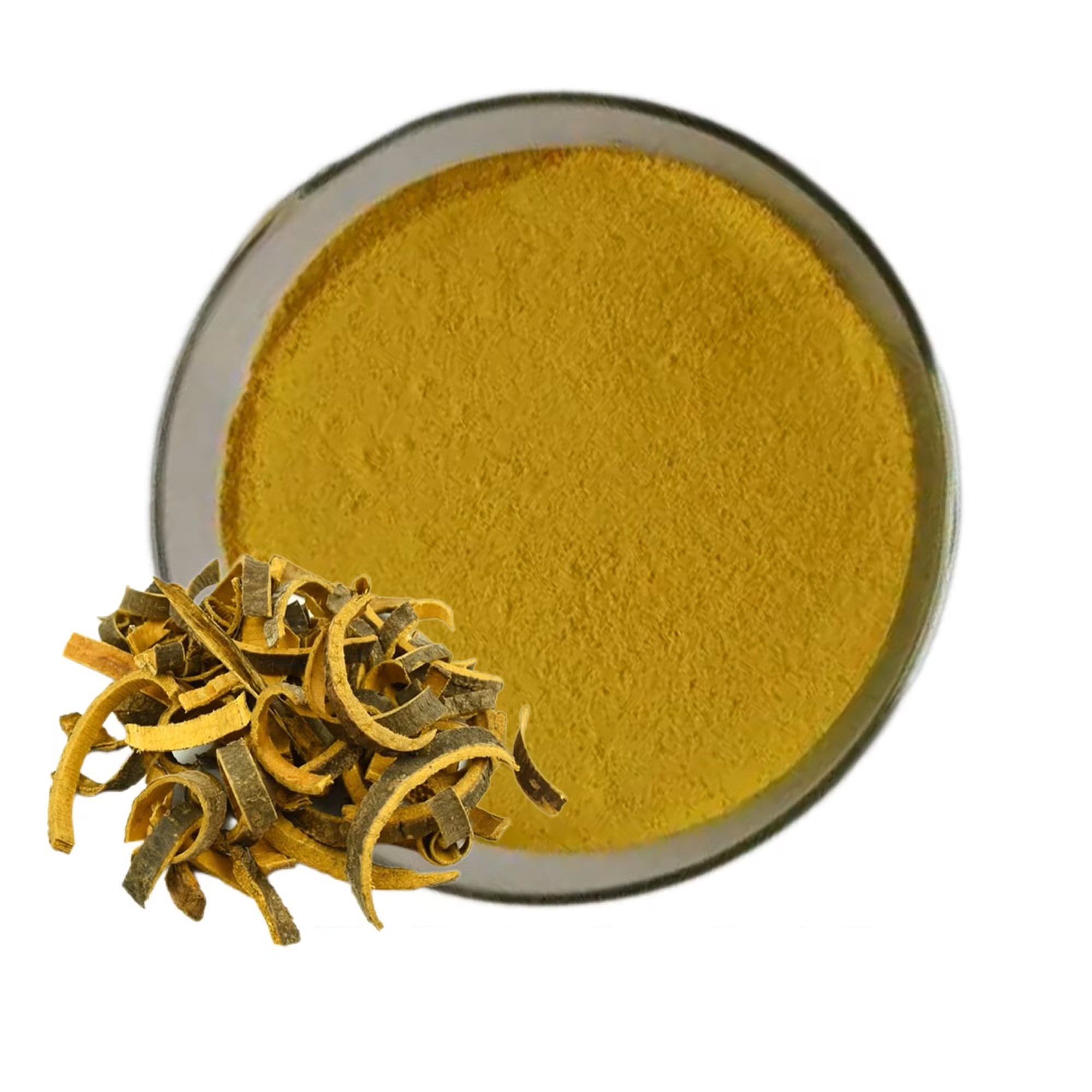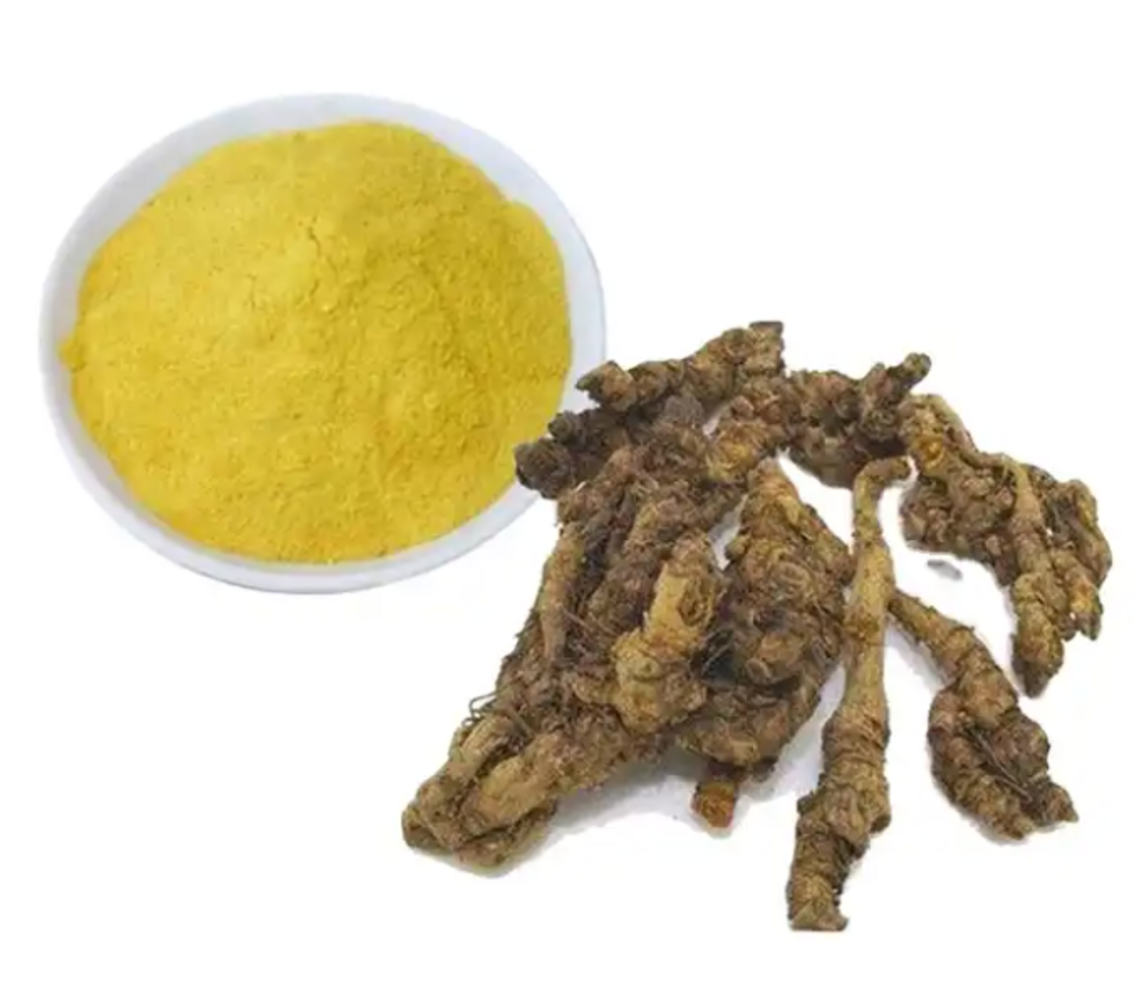Berberine Hydrochloride Bark Powder (Cortex Phellodendri Chinensis)
Product description
Berberine Hydrochloride Powder is a concentrated form of berberine, a naturally occurring alkaloid compound found in various plants, including Berberis species (such as Berberis vulgaris), Goldenseal, Oregon Grape, and Chinese Goldthread. It has been used for centuries in traditional medicine for its potent antimicrobial, anti-inflammatory, and metabolic-regulating properties. Berberine is well known for its health benefits, particularly related to blood sugar regulation and cardiovascular health.
Key Components and Nutrients:
Berberine itself is the primary active ingredient in berberine hydrochloride powder. It is an isoquinoline alkaloid with a yellow color and a bitter taste. The powder is typically standardized to contain high concentrations of berberine (often around 97% purity) to ensure maximum potency and effectiveness in supplement form. Berberine acts on various molecular pathways within the body, making it a versatile and powerful supplement.
Importance and Benefits of Berberine Hydrochloride Powder as a Supplement:
Blood Sugar Regulation: One of the most well-known and researched benefits of berberine is its ability to help regulate blood sugar levels. It has been shown to improve insulin sensitivity and reduce insulin resistance, making it a valuable supplement for individuals with type 2 diabetes or those at risk of developing the condition. Berberine helps lower fasting blood glucose levels and improves HbA1c (a long-term marker of blood sugar control). It does this by activating an enzyme called AMP-activated protein kinase (AMPK), which helps regulate glucose and fat metabolism.
Improved Lipid Profile and Cholesterol Levels: Berberine is highly effective in improving lipid profiles by reducing total cholesterol, low-density lipoprotein (LDL) cholesterol (often referred to as “bad” cholesterol), and triglycerides. At the same time, it can increase high-density lipoprotein (HDL) cholesterol, often known as “good” cholesterol. By improving lipid levels, berberine helps reduce the risk of cardiovascular disease, including heart disease and stroke.
Weight Loss and Fat Burning: Berberine has been shown to help with weight loss and fat reduction. Its ability to regulate blood sugar and improve insulin sensitivity directly affects fat storage and metabolism. Additionally, berberine activates AMPK, which plays a role in increasing fat burning and reducing fat accumulation in the body. Some studies have shown that berberine supplementation can result in significant reductions in body weight and visceral fat, making it a promising supplement for individuals struggling with obesity.
Anti-inflammatory Effects: Chronic inflammation is linked to various health problems, including cardiovascular disease, diabetes, and metabolic syndrome. Berberine has powerful anti-inflammatory properties, and research suggests that it can help reduce systemic inflammation by lowering markers like C-reactive protein (CRP). This makes berberine beneficial for people dealing with conditions characterized by chronic inflammation.
Gut Health and Digestive Support: Berberine has antimicrobial properties, making it useful for supporting gut health. It helps balance the gut microbiome by inhibiting the growth of harmful bacteria and promoting the growth of beneficial gut flora. Berberine has been found to be effective against several types of harmful bacteria, fungi, and parasites, making it a potential aid in managing gut infections and digestive disorders like irritable bowel syndrome (IBS).
Support for Heart Health: In addition to improving lipid levels, berberine supports overall cardiovascular health. It has been shown to reduce blood pressure, improve blood vessel function, and protect against oxidative stress, all of which contribute to a healthier heart. Berberine’s effects on lipid metabolism, insulin sensitivity, and inflammation further help reduce the risk of developing heart disease.
Neuroprotective Effects: Berberine has neuroprotective properties that can help protect brain cells from damage due to oxidative stress, inflammation, and neurodegenerative diseases. Some studies suggest that berberine may play a role in slowing the progression of Alzheimer’s disease and improving cognitive function. By modulating certain pathways in the brain, berberine may improve memory and reduce the risk of neurodegeneration.
Antioxidant Activity: As a potent antioxidant, berberine helps neutralize free radicals and oxidative stress, which are major contributors to aging and the development of chronic diseases. Its antioxidant properties contribute to its ability to protect various organs, including the liver, heart, and brain, from damage caused by oxidative stress.
Support for Liver Health: Berberine has hepatoprotective (liver-protecting) effects, which make it beneficial for liver health. It helps regulate fat metabolism in the liver, prevents fat accumulation (non-alcoholic fatty liver disease or NAFLD), and improves liver function. Berberine’s ability to regulate blood sugar levels and reduce inflammation also contributes to a healthier liver.
Cancer Prevention and Treatment (Preliminary Research): Preliminary research suggests that berberine may have anticancer properties. It has been shown to inhibit the growth of cancer cells in several types of cancers, including breast, liver, and colon cancer. While more research is needed in this area, berberine’s ability to regulate cell signaling pathways and reduce inflammation may contribute to cancer prevention and treatment.
Common Uses and Dosage:
Berberine Hydrochloride Powder is typically taken in capsule or tablet form, but it can also be consumed as a powder mixed with water or another beverage. The recommended dosage for berberine varies depending on the condition being treated, but a common dosage is between 500-1500 mg per day, typically divided into two or three doses throughout the day. It’s often recommended to start with a lower dose and gradually increase it to reduce the risk of digestive discomfort, such as diarrhea or bloating.
Since berberine has a relatively short half-life in the body, it’s best taken with meals to help with absorption and to maximize its effects on blood sugar and lipid levels.
Precautions and Side Effects:
While berberine is generally safe for most people when used appropriately, there are some potential side effects and precautions to consider:
- Digestive Issues: Berberine can cause gastrointestinal side effects, such as diarrhea, constipation, bloating, or cramping. Starting with a lower dose and taking it with food may help reduce these effects.
- Pregnancy and Breastfeeding: Berberine is not recommended during pregnancy or breastfeeding, as it may cross the placenta and affect fetal development.
- Blood Sugar Levels: Because berberine can lower blood sugar levels, individuals with diabetes or those taking medications that affect blood sugar should use caution and monitor their blood sugar closely. It may interact with medications like insulin or oral hypoglycemics, increasing the risk of hypoglycemia (low blood sugar).
- Drug Interactions: Berberine may interact with certain medications, including those for heart disease, blood pressure, and antibiotics. It may also interfere with cytochrome P450 enzymes in the liver, potentially altering the effectiveness of various drugs.
- Liver Health: While berberine is generally liver-protective, individuals with liver conditions should consult a healthcare professional before using it.


